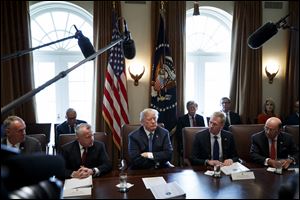
Syria actions demand international response
4/9/2018
President Donald Trump during a meeting with his Cabinet, in the Cabinet Room of the White House on Monday.
The war in Syria has become more complicated and deadly in the past days — just as it appeared to be coming to a conclusion with a military victory for the government and President Bashar Assad still in power.
First, on Saturday, government forces carried out another chemical weapons attack at Douma, east of Damascus, killing dozens of people, including children. Second, an air attack, apparently by the Israelis, was carried out on Sunday against a Syrian airbase, following up on an Israeli attack in February.
EDITORIAL: Trump administration needs single Syria strategy
The two events were apparently unrelated, although the second one was made more internationally acceptable based on the first one.
The Israeli attack, carried out against an airbase that has Russian planes as well as Iranian and Syrian assets, was intended primarily to hinder the fighting capacity of Hezbollah, fighting in Syria, based in Lebanon, but continuing to prepare to fight Israel again.
The chemical attack raises a number of questions. One of them is why, in what are probably the dying days of the civil war, Mr. Assad’s government forces chose to use such brutal means against hold-out Syrians. The larger question is whether his use of chemical weapons disqualifies him definitively for an end of the war that leaves him in power?
The second question, searching for logic in the attack, is whether in fact there is still more fight left in the Syrian rebels and their various international supporters than was previously believed?
The line-up among the international parties involved in the Syrian conflict — France, Iraq, Lebanon, Russia, Saudi Arabia, Turkey, and the United States, as well as the Kurds — also bears on what happens next in Syria. For example, are U.S. relations with Russia now such that President Donald Trump could ask Russian President Vladimir Putin to tell the Syrians to knock off the chemical attacks immediately and expect a positive response?
Click here to view more Blade editorials | Check out the Behind The Editorial series
Mr. Trump yesterday promised a rapid decision on action, as “we cannot allow atrocities like that.” A symbolic air attack on Syrian bases and aircraft might be satisfying politically, but would be inconclusive in its impact on events in Syria. An escalation to full-tilt U.S. military involvement in Syria would quickly evolve into costly conflict, including possibly with Russia and NATO ally Turkey. French President Emmanuel Macron was quick to engage with the White House, which announced that U.S. will be coordinating with France on a response, military or otherwise.
Mr. Trump should keep lines of communication open to Mr. Putin, for if there is a summit and there is a thaw, Mr. Putin can help to contain the damage in Syria.
But there is no evidence that this is of interest to the Russian leader. So the U.S. must keep all options open. We should go back to the United Nations. We should work with the French. We cannot continue to stand by and passively watch the slaughter of innocents, especially when we bear no small responsibility for this brutal civil war.